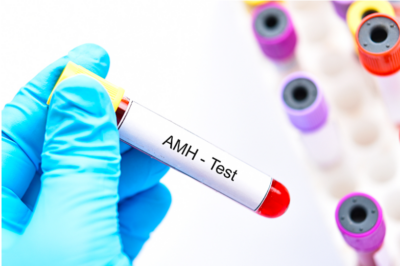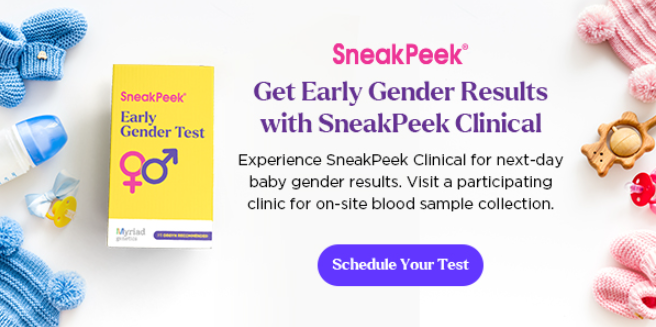Published on August 20th, 2024
Check out SneakPeek Gender Test to find out your baby’s gender as early as 6 weeks with over 99% accuracy!

There is much to learn about the world of fertility from the moment you learn when to have sex to get pregnant, to getting that irregular period you’ve been waiting for. When you’re eager to grow your family, navigating the world of fertility can be overwhelming—particularly if you’re having trouble getting pregnant. Fortunately, many hopeful parents get past the challenges and get pregnant, whether naturally or through assisted reproductive technologies (ART).
A common player to meet early in your fertility journey is anti-müllerian hormone (AMH): a hormone that’s closely related to your ability to get pregnant naturally. If an AMH test determines that your levels fall out of a normal range, you may have difficulty conceiving. In this case, it’s important to work with a healthcare provider or fertility specialist to seek the appropriate treatment.
AMH levels can tell you a lot about your fertility, as well as your risk level for reproductive conditions like polycystic ovary syndrome (PCOS). With more insight into what AMH levels are and how they relate to fertility, you’ll gain clarity and empowerment on your pathway to parenthood.
First things first: What is AMH (Anti-Müllerian Hormone)?
AMH, or anti-müllerian hormone, is a type of protein hormone made by the antral follicles in the ovaries. It’s a “signaling hormone” that’s critical for egg development because it cues follicles in your ovaries to grow.
Healthcare providers primarily use AMH as a biomarker indicating a person’s ovarian reserve (or “egg count”) and overall fertility. It can also be used to:
- Determine whether you’re approaching menopause or may be at risk of premature menopause
- Help assess whether you’re at risk of the reproductive condition polycystic ovary syndrome (PCOS)
To learn your AMH levels, you’ll need to take a blood test known as an AMH test. This can help tell you how likely you are to get pregnant naturally.
What is a recommended AMH level to get pregnant?
AMH levels tend to follow a normative pattern in a female’s lifetime. Typically, they reach a peak during the reproductive years and fall off abruptly before and during menopause.
A normal AMH range (and a good AMH level for getting pregnant) is between 1.0 ng/mL and 3.0 ng/mL.
What AMH levels are sub-optimal AMH for getting pregnant?
Many females’ AMH levels don’t follow the typical pattern. For people who struggle with infertility, AMH levels can decline earlier than menopausal age (which, on average, is 51 years old).
AMH levels below the 1.0 ng/mL are considered a red flag for hopeful parents and may indicate a need for fertility treatment. Additionally, 0.4 ng/mL is considered severely low and may indicate that a person has started menopause or premature menopause.
In other cases, AMH levels can be abnormally high. Often, high AMH levels indicate the presence of the condition known as polycystic ovary syndrome (PCOS). PCOS, which impacts an estimated 10% of reproductive-aged women, can cause an overgrowth of antral follicles (more antral follicles typically correlate with higher AMH levels).
PCOS can impact fertility because it may interfere with normal ovulation patterns. If you take an AMH test that indicates high levels of the hormone, working with a healthcare provider to screen for PCOS can help you establish a treatment program.
Can you change your AMH levels?
Now you are likely thinking about how to increase your AMH level. Unfortunately, there is no conclusive evidence to suggest you can change your AMH levels. That said, various factors contribute to the health and volume of your ovarian reserve, and concerted lifestyle changes and clinical treatments may help boost female fertility.
Lifestyle Changes
Sometimes, lifestyle factors like nutrition and exercise habits can contribute to lower-than-average AMH levels and a low ovarian reserve. Making some sustainable adjustments may have a markedly positive effect on your reproductive health; in fact, 33% of patients with a low ovarian reserve may be able to get pregnant naturally with lifestyle interventions and treatment.
This could involve:
- Optimizing nutrition – People who are obese or overweight are more likely to struggle with fertility. This is because they’re at higher risk of developing PCOS, as well as reduced egg quantity and quality. Losing weight and eating a nutritious diet may help make you healthier overall, supporting your ovarian reserve and ability to carry a baby.
- Avoiding tobacco – Certain drugs, particularly tobacco, have been shown by the American Society of Reproductive Medicine to diminish egg quality and fertility outcomes.
Fertility Medicines
Some cases of female infertility can be traced to issues with ovulation. Certain medications can help trigger ovulation if ovulatory cycles are dysregulated or absent.
Some of the more common fertility drugs include:
- Clomiphene citrate, an oral medication that triggers the release of FSH and LH, two key hormones involved in egg development and ovulation.
- Gonadotropins, of which there are several types. Gonadotropins stimulate the ovaries to grow and mature eggs.
- Metformin, which is used to treat infertility in individuals with insulin resistance or diabetes. This treatment is considered optimal for many people with PCOS.
- Letrozole, another medicine frequently used for people with PCOS.
Determining which medication can help you get pregnant depends on the root cause of your fertility struggles, and requires assessment and prescription from a healthcare provider.
Living with Low AMH Levels: Options for Navigating Your Fertility Journey
On the pathway to becoming a parent, up to 11% of women are estimated to encounter challenges with fertility. While AMH levels are important for getting pregnant, not all cases of infertility stem from problems with this hormone.
It’s estimated that:
- ⅓ of fertility challenges result from female fertility impairment
- ⅓ of fertility challenges result from male fertility impairment
In the remaining ⅓, the root cause of fertility struggles isn’t clear.
If you’ve discovered sub-optimal AMH levels—whether too low or too high—it’s important to work with a healthcare provider (and consider working with a fertility specialist). Though AMH levels can’t always be changed, many treatment modalities and interventions can assist you in growing your family while protecting your health.
Consult a Fertility Specialist
Fertility specialists, also known as reproductive endocrinologists, assess you (and, if applicable, your partner) to determine the root cause of your fertility troubles. With greater insight into your health, they can help develop a treatment program that can optimize your chances of getting pregnant.
In addition to ovarian reserve testing, your specialist may request:
- Ovulation testing, which assesses whether you’re still ovulating
- Thyroid testing, which determines whether fertility issues may stem from a thyroid problem
- Hysterosalpingography, which checks to see if your uterus and fallopian tubes are healthy
If you’re trying to get pregnant with a partner, it’s equally important they be tested too. Some common fertility testing for males includes:
- Hormone testing, which assesses levels of testosterone and other male sex hormones
- Semen analysis, which tests the quantity and quality of sperm
- Genetics testing, which can help determine whether genes are the cause of your fertility struggles
All individuals may benefit from imaging tests to see whether an anatomical issue is contributing to infertility.
Prioritize a Healthy Lifestyle
When your body is healthy, you have a greater chance of conceiving and carrying a pregnancy to term. To that end, many fertility specialists advise focusing on:
- Nutritional balance – Pro-fertility diets are rich in whole foods. It’s also helpful to eat plenty of antioxidants, as they may help improve the quality of your ovarian reserve.
- Regular exercise – It’s important to avoid a sedentary lifestyle if you’re trying to have a baby. Experts recommend adults get at least 150 minutes of exercise per week, minimum.
- Healthy stress management – Low-stress lifestyles are associated with better fertility outcomes and improved health overall. It’s important to find the tools that work for you, whether mindfulness practices, meditation, or even working with a therapist.
Look Into Assisted Reproductive Technologies (ARTs)
Many people lean on fertility herbs to get pregnant or vitamins to get pregnant fast. Modern fertility testing has developed other options for couples struggling to get pregnant. Today, there are many options for expanding your family even if you are struggling with natural conception.. However, different treatments have varying levels of invasiveness, so it can help to get some clarity around which kinds of modalities appeal to you and your needs.
Some popular fertility treatments include:
- Freezing your eggs – Clinically known as oocyte cryopreservation, egg freezing is an increasingly common practice. It’s popular among females who:
- Are struggling with fertility and want to preserve their chances of having a baby
- Have been diagnosed with an illness like cancer
- Know they want children eventually, but aren’t ready to have them just yet
To have your eggs frozen, you’ll need to take some medications to stimulate oocyte
growth. Then, a specialist will retrieve your eggs and freeze them for storage.
Cryopreservation can be costly, averaging between $5,000 and $10,000.
- In vitro fertilization (IVF) – IVF is considered one of the most effective means of combating infertility. In the procedure, your ovaries are stimulated to produce multiple eggs. Then, the eggs are retrieved and eventually fertilized into an embryo. IVF does carry a higher risk of getting pregnant with multiples, but it’s also an effective way to grow your family if you’re struggling on your own.
Learn From Pregnancy to Parenthood with the SneakPeek® Test
When you’re ready to meet your little one on the way, check out the SneakPeek Early Gender DNA Test®. With this at-home test, parents-to-be can learn their baby’s fetal sex as early as 6 weeks into pregnancy, with over 99% clinically proven accuracy and DNA-based results.
Over 1 million parents trust SneakPeek to break the news of their future baby’s fetal sex sooner than ever. Learn why SneakPeek is the #1 OBGYN-recommended at-home fetal sex test by ordering yours today.
Editorial Policy
At SneakPeek, our commitment is to provide accurate, up-to-date, and reliable information to empower our readers. Our content is thoroughly researched, reviewed by medical experts, and fact-checked to ensure its credibility. We prioritize the well-being and education of our readers, and our editorial policy adheres to the highest standards of integrity and accuracy in all our articles.
This post has been reviewed for accuracy by:
Haley Milot, a highly skilled laboratory professional, currently serves as the Associate Director of Lab Operations at Gateway Genomics, the parent company of SneakPeek. Her extensive experience in laboratory management, spanning over seven years with Gateway Genomics, showcases her expertise in quality assurance, quality control, and the development of laboratory procedures. Haley's background includes pivotal roles in DNA extraction and purification, real-time qPCR, and specimen accessioning, underscoring her comprehensive understanding of laboratory operations and diagnostics. Her adeptness in managing complex laboratory functions and her deep knowledge of medical diagnostics make her a vital contributor to SneakPeek's innovative approach to prenatal testing.
Sources:
- Centers for Disease Control and Prevention. ART Success Rates. https://www.cdc.gov/art/artdata/index.html
- National Library of Medicine. AMH and Its Clinical Implications. https://www.ncbi.nlm.nih.gov/pmc/articles/PMC7515982/
- National Library of Medicine. Anti-Müllerian Hormone Test. https://medlineplus.gov/lab-tests/anti-mullerian-hormone-test/
- National Library of Medicine. AMH and Its Clinical Implications. https://www.ncbi.nlm.nih.gov/pmc/articles/PMC7515982/
- Cleveland Clinic. Anti-Mullerian Hormone Test. https://my.clevelandclinic.org/health/diagnostics/22681-anti-mullerian-hormone-test
- Mayo Clinic. Menopause. https://www.mayoclinic.org/diseases-conditions/menopause/symptoms-causes/syc-20353397
- Verywell Health. PCOS Facts and Statistics: What You Need to Know. https://www.verywellhealth.com/pcos-facts-and-statistics-5498625#toc-how-common-is-pcos
- Verywell Health. PCOS and Anti-Müllerian Hormone. https://www.verywellhealth.com/what-is-anti-mullerian-hormone-or-amh-2616427
- Healthline. What Is Diminished Ovarian Reserve and What Can You Do About It? https://www.healthline.com/health/diminished-ovarian-reserve
- Healthline. Anti-Mullerian hormone (AMH) Testing and What It Can Tell You. https://www.healthline.com/health/fertility/amh
- Cleveland Clinic. Diminished Ovarian Reserve. https://my.clevelandclinic.org/health/diseases/23975-diminished-ovarian-reserve
- Mayo Clinic. Infertility. https://www.mayoclinic.org/diseases-conditions/infertility/diagnosis-treatment/drc-20354322
- National Institutes of Health. National How common is infertility? https://www.nichd.nih.gov/health/topics/infertility/conditioninfo/common
- UCLA Health. 6 foods that boost fertility. https://www.uclahealth.org/news/article/6-foods-boost-fertility
- Verywell Family. Fertility Foods to Boost Your Odds of Conception. https://www.verywellfamily.com/fertility-foods-recipes-1959903
- What to Expect. Exercise When You’re Trying to Get Pregnant. https://www.whattoexpect.com/getting-pregnant/health-and-wellness/safeguard-your-health/exercise-before-pregnancy.aspx
- National Library of Medicine. The relationship between stress and infertility. https://www.ncbi.nlm.nih.gov/pmc/articles/PMC6016043/
- Cleveland Clinic. What to Know About Freezing Your Eggs. https://health.clevelandclinic.org/freezing-your-eggs-the-pros-cons
- Healthline. What to Expect from the Egg Freezing Process. https://www.healthline.com/health/egg-freezing-process
- Cleveland Clinic. IVF (In Vitro Fertilization). https://my.clevelandclinic.org/health/treatments/22457-ivf#risks-benefits








